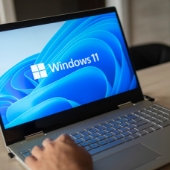 Microsoft released Windows 11 in October 2021. As of October 2022, only 15.44% of PCs around the world run the new operating system (OS); 71.29% are still using Windows 10. One possible reason for the slow adoption of the new OS is that Windows 11 would not install on devices that lack Trusted Platform Module (TPM) 2.0 chips.
Microsoft released Windows 11 in October 2021. As of October 2022, only 15.44% of PCs around the world run the new operating system (OS); 71.29% are still using Windows 10. One possible reason for the slow adoption of the new OS is that Windows 11 would not install on devices that lack Trusted Platform Module (TPM) 2.0 chips.
What is a TPM chip?
A TPM is a security chip that’s commonly found in the latest smartphones and PCs. It provides a hardware-based, tamper-resistant environment to create, store, and safeguard encryption keys in order to ensure secure access to data stored on a device. So if an unauthorized person gains access to your device and tries to tamper with your encrypted drives, the chip will stop the device from booting up.
Some apps and web services also use TPMs. For example, Outlook uses a TPM for managing encrypted emails. On the other hand, web browsers use TPM to store SSL certificates that are used to authenticate and create encrypted connections with websites.
Why shouldn’t you bypass Windows 11’s TPM requirement?
Some users find Windows 11’s TPM 2.0 requirement too restrictive. After all, they were able to use Windows 10 securely with just TPM 1.2 embedded in their devices. This has led them to search for ways to circumvent the TPM restriction so that their devices that don’t have the TPM 2.0 chip can still run the new OS. However, we recommend abiding by Windows 11’s hardware requirements instead for these reasons.
TPM 2.0 is more secure than TPM 1.2
TPM 2.0 provides higher levels of security, as it supports more and newer cryptographic algorithms than its predecessors. This enables it to create stronger keys, making devices that use it more challenging for cybercriminals to compromise.
Compatibility issues may arise
Before releasing Windows 11, Microsoft tested the OS extensively on supported devices. This means that running Windows 11 on devices that don’t meet the hardware requirements may lead to compatibility issues that can create problems, such as glitches and even outright failure. Addressing such problems may end up becoming more expensive than simply purchasing supported devices to begin with.
Microsoft won’t release updates for unsupported devices
Software updates are extremely important. They don’t only enhance the user experience through new features and quality-of-life upgrades, but updates also improve the OS’s defenses against even the newest cyberthreats. This means not receiving updates will put your device and business IT systems at greater risk of cyberattacks.
If you’re tempted to circumvent Windows 11’s hardware requirements, particularly those related to security, just keep this adage in mind: “Just because you can, doesn’t mean you should.”
To learn more about Windows 11 and how you can make the most out of its features, get in touch with us.




